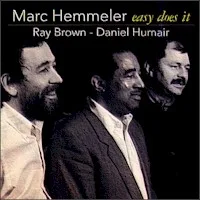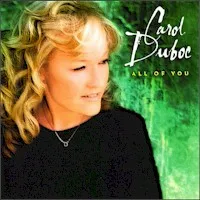Time: 42:41
Size: 97.7 MB
Styles: Standards, Vocal jazz
Year: 2000
Art: Front
[4:40] 1. One Trick Pony
[3:29] 2. Romantically Helpless
[4:33] 3. I'll Be Here
[2:09] 4. Ghosts
[3:52] 5. Come Fly With Me
[2:51] 6. Dedicated To The One I Love
[3:25] 7. That Old Black Magic
[4:02] 8. If I Start To Cry
[2:58] 9. Loving You
[3:54] 10. Make It Go Away
[3:13] 11. Don't Fence Me In
[3:29] 12. Same Girl
Holly Cole: vocals; Aaron Davis: piano, organ, Fender Rhodes, synthesizer; David Piltch: acoustic bass; Mark Ferguson: piano, trombone; Mark Kelso: drums, 2nd line groover, background vocals; Luc Boivin: percussion, 2nd line groover; Steve Ferrera: 2nd line groover; George Koller: acoustic bass, electric bass; David Gray: acoustic and electric guitars; Kevin Breit: acoustic and electric guitars, dobro; Gerry Leonard: electric guitar; Kim Ratcliffe: guitars; Tory Cassis: background vocals.
The irony of this CD title is hard to miss. Holly Cole’s confident, smoky alto might convey dark humor or cautious optimism, painful regret or self-aware neurosis, but definitely not helplessness. Ms. Cole combines the modern, post-feminist attitude of the Lilith Fair crowd with the sophistication of a pre-rock interpretative singer. Holly Cole has always been difficult to categorize. Jazz purists have never been taken with Ms. Cole’s eagerness to embrace contemporary music forms or her tendency to subvert material from the standard repertoire. Unlike Cassandra Wilson, who transposes rock and pop material into her own unique form of acoustic jazz, Ms. Cole frequently crosses the line that separates jazz and pop. In that respect, Ms. Cole’s artistic sensibility is surprisingly close to that of Peggy Lee’s. Although their styles and voices are very different, Ms. Cole shares Ms. Lee’s affinity for creating deeply personal interpretations out of a wide range of pop material. And like Ms. Lee, Ms. Cole uses jazz as simply one of many interpretive devices rather than as the raison d’ệtre for every performance.
Romantically Helpless, the Canadian singer’s sixth full-length studio album, brings together the different facets of Ms. Cole’s music. Two thirds of the recording mark a return to her early, more jazz-oriented roots. Ms. Cole’s highly idiosyncratic interpretations, often set to a stark, minimalist accompaniment, tend to bring out the dark undercurrents of a lyric. She gives envy an edge in a slinky version of Paul Simon’s “One Trick Pony” and transforms “Dedicated to the One I Love” into a stalker’s love song. Ms. Cole extracts bitterness and hurt from Randy Newman’s “Ghosts” and “The Same Girl” rather than the detached sarcasm usually associated with that composer’s songs. In contrast, her respectful, straightforward reading of Stephen Sondheim’s “Loving You” seems oddly stilted and unexpressive. The three decidedly more upbeat standards offer a welcome respite from the album’s melancholy tone. The brassy swing arrangement of “That Old Black Magic” does not suit Ms. Cole. She is simply not that kind of jazz singer. She is far more appealing on “Come Fly With Me” where she relaxes the tempo giving this usually hard driving song a feeling of affectionate romanticism. Ms. Cole also has a grand time on a version of “Don’t Fence Me In” that isn’t really any more tongue-in-cheek than Bing Crosby’s original recording of the song. The remainder of the album features radio-friendly pop arrangements of songs by both of Ms. Cole’s long time collaborators, Aaron Davis and David Piltch. As far as pop music goes, most of these tracks are fine with “Make It Go Away” the standout. ~Mathew Bahl
The irony of this CD title is hard to miss. Holly Cole’s confident, smoky alto might convey dark humor or cautious optimism, painful regret or self-aware neurosis, but definitely not helplessness. Ms. Cole combines the modern, post-feminist attitude of the Lilith Fair crowd with the sophistication of a pre-rock interpretative singer. Holly Cole has always been difficult to categorize. Jazz purists have never been taken with Ms. Cole’s eagerness to embrace contemporary music forms or her tendency to subvert material from the standard repertoire. Unlike Cassandra Wilson, who transposes rock and pop material into her own unique form of acoustic jazz, Ms. Cole frequently crosses the line that separates jazz and pop. In that respect, Ms. Cole’s artistic sensibility is surprisingly close to that of Peggy Lee’s. Although their styles and voices are very different, Ms. Cole shares Ms. Lee’s affinity for creating deeply personal interpretations out of a wide range of pop material. And like Ms. Lee, Ms. Cole uses jazz as simply one of many interpretive devices rather than as the raison d’ệtre for every performance.
Romantically Helpless, the Canadian singer’s sixth full-length studio album, brings together the different facets of Ms. Cole’s music. Two thirds of the recording mark a return to her early, more jazz-oriented roots. Ms. Cole’s highly idiosyncratic interpretations, often set to a stark, minimalist accompaniment, tend to bring out the dark undercurrents of a lyric. She gives envy an edge in a slinky version of Paul Simon’s “One Trick Pony” and transforms “Dedicated to the One I Love” into a stalker’s love song. Ms. Cole extracts bitterness and hurt from Randy Newman’s “Ghosts” and “The Same Girl” rather than the detached sarcasm usually associated with that composer’s songs. In contrast, her respectful, straightforward reading of Stephen Sondheim’s “Loving You” seems oddly stilted and unexpressive. The three decidedly more upbeat standards offer a welcome respite from the album’s melancholy tone. The brassy swing arrangement of “That Old Black Magic” does not suit Ms. Cole. She is simply not that kind of jazz singer. She is far more appealing on “Come Fly With Me” where she relaxes the tempo giving this usually hard driving song a feeling of affectionate romanticism. Ms. Cole also has a grand time on a version of “Don’t Fence Me In” that isn’t really any more tongue-in-cheek than Bing Crosby’s original recording of the song. The remainder of the album features radio-friendly pop arrangements of songs by both of Ms. Cole’s long time collaborators, Aaron Davis and David Piltch. As far as pop music goes, most of these tracks are fine with “Make It Go Away” the standout. ~Mathew Bahl
Romantically Helpless




















